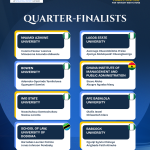(SEMINAR 4)
Date: 26 June, 2020
Time: 8PM
Topic: Referencing in Legal Writing
Moderator: Nana B. Mensah-Bonsu
Platform: Zoom
The seminar commenced at exactly 20:00hrs GMT. The moderator, Nana B. Mensah-Bonsu, had the floor at about 20:05hrs GMT.
The main focus of the seminar was on the use of the Oxford University Standard for Citation of Legal Authorities (OSCOLA) and Pretoria University Law Press (PULP) referencing styles. The moderator commenced with highlighting what “legal referencing” is. According to him, legal referencing can also be referred to as legal citation. It is the practice of crediting and referring to authoritative documents and sources most common of which can be cited in law books or articles are court decisions, statutes, regulations, treaties, inter alia.
It was also pointed out that as long as referencing rules are followed, everyone can and should be involved in legal referencing.
The Moderator, in his presentation, made a comparison of the OSCOLA and PULP referencing styles grouping them into three (3) major categories, to wit:
- Referencing Court decisions (Cases)
- Referencing Legislation
- Referencing books
- Referencing Court Decisions (Cases):
According to the Oscola style of referencing court decisions or cases, the following model should be followed:- Name of the case, the neutral citation (if appropriate), volume, and first page of the law report and where necessary, the court. A typical example as was shared by the moderator is Philips v Boardman [1967] 2 AC 46 (HL).
On the other hand, the moderator divided the Pulp’s referencing style into the South African and foreign courts decisions. For SA cases, it usually follows the pattern of the name of the case, the year, the volume, page number and court- for instance, S v Makwanyane and Another 1995 3 SA 391 (CC). For foreign cases, it begins with the name of the case, year, volume, law report, and page number. An example is Goldberg v Kelly 397 US 235.
- Referencing Legislation:
Oscola method of referencing for legislation or statues comprises of just the name of the statute and the section, such as Human Rights Act 1998, s. 3. While the Pulp style, on the other hand, comprises of the name of the legislation, number of the legislation, year, and section- Industrial Relations Act 8 of 2000 s. 12(1).
- Referencing Books:
The Moderator also highlighted some major differences in Oscola and Pulp referencing styles in referencing books.
In conclusion, several comments were entertained and the moderator thanked everyone for staying tuned. The Law students were also advised to be sure of the particular referencing style adopted by their institution in legal referencing of their long essay project works or seminar presentation. The seminar ended at exactly 20:37hrs GMT.
Chubby Obianyo, LL.M
Reporting.



